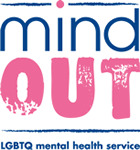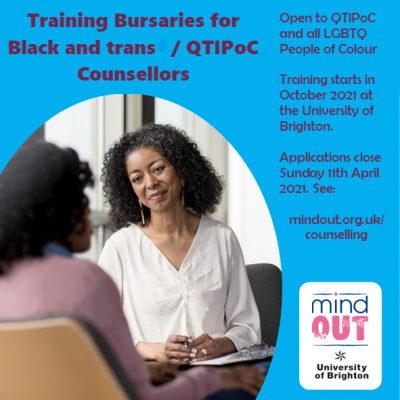MindOut are excited to offer a limited number of bursaries for Black and trans/QTIPOC counsellors to undertake training.
Bursaries are open to QTIPoC (Queer, trans and/or Intersex People of Colour) and to all LGBTQ People of Colour. We recognise that Black people in our communities face exceptional barriers and we expect that at least one recipient will be Black. We especially hope to award eligible QTIPoC, as people with these intersectional identities have been historically excluded from the counselling profession.
MindOut is offering these bursaries, in partnership with the University of Brighton for students to join their Humanistic or Psychodynamic PGDip courses. These two-year part-time trainings start in October 2021, and will be attended in person (so applicants should be local, or available to travel for study). Applicants should hold any undergraduate degree or a professional qualification (e.g. nursing, teaching) and should have completed at least a Level 2 Certificate in Counselling Skills by the time the course starts, and have experience of personal therapy as a counselling client. Bursaries will cover 50% of course fees and related expenses (personal therapy, supervision etc.) – recipients will be offered a training placement in-house with MindOut’s busy, low-cost LGBTQ counselling service.
Download an application form here: mindout.org.uk/…/MindOut_QTIPoC_Bursary_Application_Form-1.docx
Applications will close Sunday, 11th April. A two-stage interview process will run through April and into early May.
Frequently Asked Questions
How do I apply?
Download an application form here: mindout.org.uk/…/MindOut_QTIPoC_Bursary_Application_Form-1.docx
Applications will close Sunday, 11th April. A two-stage interview process will run through April and into early May.
A two-stage interview process will run through April and into early May. You do not need to apply separately to the University of Brighton, this will be done as part of your bursary application (if you are invited to stage 2). However if you have already been offered a place on their course you may apply retrospectively for a bursary, subject to our deadline. Please ask for details.
Isn’t MindOut a small charity? How can you afford these bursaries?
We have received one –off donations from this year which which allow us to offer these bursaries now. If this pilot is successful, we may be able to access funds to offer more bursaries in future.
How many bursaries are available?
We expect to offer at least 2 training bursaries on a 50% basis (covering 50% of course fees and related expenses such as personal therapy, supervision etc.) – this amounts to around £3,304 per year for two years, and applicants will need to meet the rest of those costs themselves.
I can’t afford to meet the rest of the course costs myself. Can you offer more than 50% bursary?
We recognise that finance can be a significant barrier to entering the counselling profession – one reason why it might historically be seen as a white, cis-gendered and middle-class profession. We also have a responsibility to spend these funds carefully, maximising the long-term positive impact for Black and trans communities. We need to be confident that those who start the training will be in a strong position to complete it, over a 2+ year period. This means that we sadly cannot fund those who do not afford the remainder of the costs.
I’m Black but not LGBTQ. Can I apply?
Unfortunately not. We do recognise the importance of training more Black counsellors irrespective of sexual orientation or trans history. However, all MindOut activities are offered ‘by and for LGBTQ people’ and this is vitally important to our clients and service users, staff and volunteers, and funders.
I’m trans but not Black / not a Person of Colour. Can I apply?
Unfortunately not. These Bursaries are targeted at Black LGBTQ and QTIPoC communities who are historically excluded from the counselling professions and who are currently under-represented. Our intention is to increase the provision of relevant counselling services for people with these intersectional identities.

